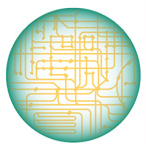The Genetics of Pathogen and Microbiome Control in the Switchgrass Leaf
Authors:
Acer Van Wallendael1,2* (vanwall1@msu.edu), G. M. M. Benucci1,2, P. B. da Costa1,2, L. Fraser1,2, F. Fritschi3, T. E. Juenger4, J. T. Lovell5, G. Bonito1,2, and D. B. Lowry1,2
Institutions:
1Michigan State University; 2Great Lakes Bioenergy Research Center; 3University of Missouri; and 4University of Texas; and 5HudsonAlpha Center for biotechnology
Goals
This study aims to uncover genetic regions responsible for governing switchgrass responses to both pathogenic and mutualist fungi, and to understand how these responses may be coordinated.
Abstract
Leaf fungal microbes can be fundamental drivers of host plant success, as they consist of pathogens that devastate crop plants as well as taxa that enhance nutrient uptake, discourage herbivory, and antagonize pathogens. In a replicated diversity panel of biofuel switchgrass, researchers quantified genetic and environmental variation in leaf fungal relationships, both for the whole microbiome and for a specific pathogen, leaf rust. While fungal colonization of the leaf varies over space and time, researchers uncovered genome-wide associations (GWAs) with several informative loci. In particular, three cysteine-rich receptor-like kinase genes (crRLKs) were linked to a genetic locus associated with microbiome structure. Since each of these genes is consistently upregulated in switchgrass genotypes typically more susceptible to fungal disease, researchers conclude that they may play a central role in the plant’s response to pathogens. Response to leaf rust is polygenic and environmentally sensitive, but resistance alleles are associated with higher biomass, indicating that breeding for rust-resistant plants will benefit growth without trade-offs in the absence of rust. Switchgrass response to fungal colonists is complex and variable, but an experimental design that accounts for variation over space and time allows for greater definition on genetic loci underlying fungal interactions.
References
VanWallendael, , 2022. “Host Genotype Controls Ecological Change in the Leaf Fungal Microbiome.” PLoS Biology 20(8), e3001681.
VanWallendael, , 2020. “Geographic Variation in the Genetic Basis of Resistance to Leaf Rust between Locally Adapted Ecotypes of the Biofuel Crop Switchgrass (Panicum virgatum).” New Phytologist 227(6), 1696–1708.
Funding Information
The plant material is based upon work supported in part by the Great Lakes Bioenergy Research Center (glbrc.org), U.S. Department of Energy, Office of Science, Office of Biological and Environmental Research under Award Number DE-SC0018409. Support for this research was provided by the National Science Foundation Long-term Ecological Research Program (DEB 1832042; https://beta.nsf.gov/funding/opportunities/long-term-ecological-research-lter) at the Kellogg Biological Station and by Michigan State University AgBioResearch. Researchers received further funding from the U.S. Department of Energy (energy.gov) through grants DE-SC0014156 to TEJ and DE-SC0017883 to DBL and National Science PGRP Award IOS1402393 to J.T.L. The work conducted by the U.S. Department of Energy Joint Genome Institute (https://jgi.doe.gov/) is supported by the Office of Science of the U.S. Department of Energy under Contract No. DE-AC02-05CH11231.
